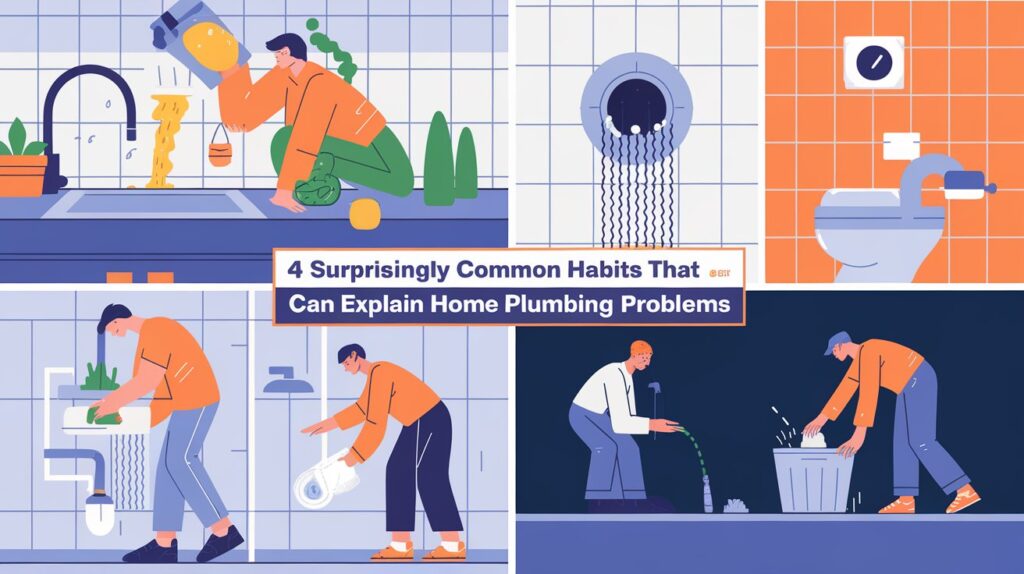Your home is your cozy, safe place that inspires comfort and relaxation. However, being able to cherish this comfort requires home maintenance and work. Plumbing issues can plague the best-kept houses, often because of everyday habits you may not realize are unfavorable.
Very often, plumbing problems start as leaks and dampness. One fine day, they may blow up into emergencies that mandate a day (or a few) off work and dipping into your savings. A study by Hippo, an insurance group, found that 83% of homeowners faced unexpected home repairs in 2024. The percentage was only 46% in 2023.
Let’s find out which habits may be hurting your home’s plumbing system so you can start eliminating them right away.
1. Flushing Things Down The Toilet
Other than what you should flush, that is. Many people flush wipes down the toilet. You can even find flushable wipes in supermarkets, whose whole point seems to be hassle-free disposal.
However, recent consumer reports show that these wipes can also aggravate plumbing problems. The concern is that they don’t break down like toilet paper but form clumps that can clog plumbing.
Besides household plumbing issues, flushing these wipes can also be damaging to the environment. You don’t wish them to end up in oceans and impact aquatic life.
Strangely enough, some women flush hygiene products like tampons down the toilet. The Guardian discusses a situation where women may defend their choice by citing “hygiene” or independence in managing their wellness. However, tampons can clog toilets and lead to significant plumbing problems that will become everyone’s headache.
2. Not Clearing Collected Hair in the Drain
Do you tend to shave in the shower just because it feels convenient? Hair strands can rapidly build up in the drain when many household members share a bathroom. More people now lose more hair than before due to environmental conditions and lifestyle stress.
It may feel gross collecting hair stuck in your shower drain, but not doing so can be worse. Over time, hair can clog drains, especially when mixed with soap and scum. You may have to incur considerable expenditure getting your plumbing inspected and fixed due to an avoidable habit.
An associated decision that can also be damaging to household plumbing is relying on chemical drain cleaners. They seem like a go-to solution to unclog hair-blocked drains. GlobeNewsWire reports that the drain cleaner market is growing at almost 6 percent and will surpass USD 3 billion by 2029.
Unfortunately, these products often have abrasive chemicals that can weaken piping materials. Using them on pipes that are already rusting or cracked can cause irreparable damage. It is better to request a professional consultation in such cases. You can consider enzymatic cleaners, which strive to be safer than chemical-laden alternatives.
3. Ignoring Plumbing Inspection Until an Emergency
It’s freezing outside. You try to warm your hands around a cup of hot cocoa. Suddenly, the pipes in the bathroom burst.
Bursting pipes are a frequent problem in some areas during American winters, where temperatures can fall several degrees under freezing point. Charlotte, North Carolina, often experiences temperatures around 18°F in winter and storms that make the weather feel chillier. Non-insulated pipes in homes in these cities can burst as a result.
The problem is that many homeowners overlook routine plumbing inspections until an emergency. Leaky faucets and signs of water damage may exist for several weeks before an incident.
Scheduling periodic professional inspections can alert you to such imminent dangers. According to Jim Dickerson Plumbing & HVAC, you should prioritize transparent pricing and be wary of commission-based agents that may push a plumbing system you don’t require.
4. Disposing Of Grease Down The Kitchen Sink
How do you tackle the leftover oil from preparing chicken nuggets and fries for the children? As it turns out, some people dispose of the oil down the kitchen sink.
At first, it may seem like a tiny amount that won’t do any damage. But add to it food particles that also end up in the drains because you weren’t diligent while washing the dishes. Grease and food can cause clogs, leading to drainage issues over time. You may experience sewer backups and overflows.
An efficient way to eliminate grease is to let it solidify and then place it in a container. (You can use a product, like plant-based flakes, to speed up this solidification.) This container can be in your everyday trash. You can also absorb oil with paper towels and then dump them in the bin.
What if you have been doing this habitually? Experts suggest rinsing the sink out with hot water-lots of it. Here again, drain cleaners are questionable. They can emit toxic fumes and damage drains in the long term.
Are you guilty of any of the above mistakes that could be impacting your household plumbing from within?
Even if you have been particular about keeping drains clean and clog-free, a routine checkup never hurts. Consider scheduling an inspection after unexpected weather events, such as a sudden cold spell or a hurricane. Catching damage early is often the best way to minimize home repair expenditure.

